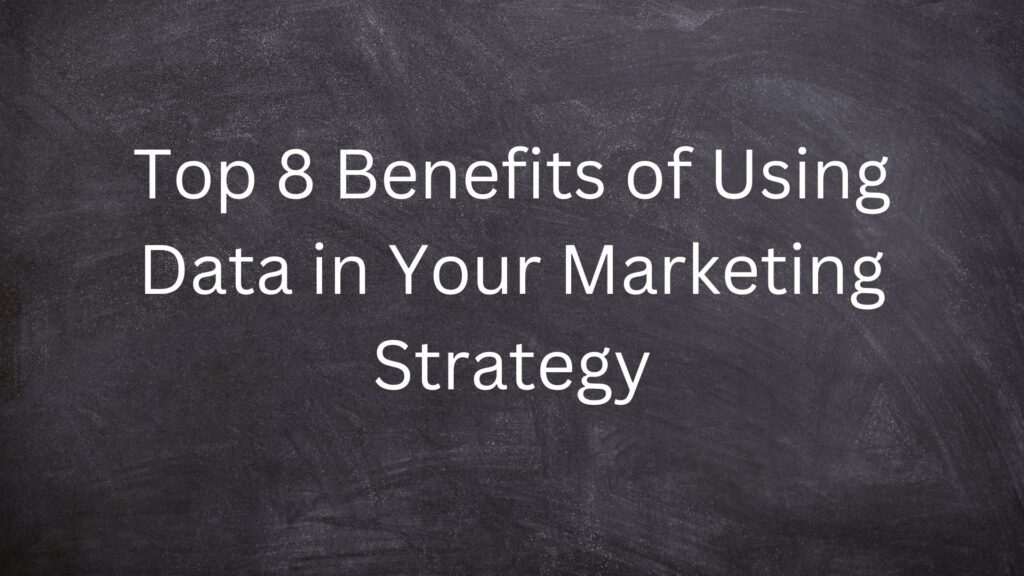In today’s fast-paced digital world, data has become an invaluable asset for marketers. By integrating data into your marketing strategy, you can make well-informed decisions, target audiences more precisely, and increase your marketing ROI. Data-driven marketing isn’t just a trend; it’s a powerful approach that provides a clearer understanding of your customers, allowing you to build more effective and personalized campaigns. This article will delve into the top eight benefits of using data in your marketing strategy and explain why it is essential for success in modern marketing.
1. Enhanced Audience Targeting
Data allows marketers to understand their audience on a deeper level. Through analytics and data collection tools, you can gather information on demographics, preferences, behaviors, and purchase history. With this insight, you can create highly specific audience segments and personalize messages to resonate with each group. Instead of a one-size-fits-all approach, data-driven targeting enables you to reach the right people with the right message, leading to more meaningful interactions and better conversion rates.
- Demographics and Behavior Insights: Understanding age, location, income, and interests helps in tailoring content and advertisements.
- Improved Personalization: By knowing individual preferences, marketers can customize product recommendations and offers, making them more relevant.
2. Improved Decision-Making
Data empowers marketers to make decisions based on evidence rather than assumptions. With access to real-time data and analytical tools, marketers can evaluate the performance of their campaigns and adjust them as needed. This approach minimizes guesswork and helps in predicting outcomes more accurately.
- Real-Time Analytics: Data provides up-to-date information, allowing marketers to make adjustments swiftly.
- Reduced Risk: Decisions backed by data reduce the likelihood of errors, helping companies allocate resources more effectively.
3. Better Customer Experience
A data-driven marketing strategy enables businesses to deliver a superior customer experience. By analyzing data on customer interactions, feedback, and preferences, companies can improve their services and make interactions more enjoyable. This approach fosters loyalty, encouraging customers to return.
- Enhanced Customer Support: Knowing customer issues and preferences allows for faster and more accurate responses.
- Smoother Purchase Journey: Data can reveal pain points, allowing marketers to streamline the shopping experience and reduce cart abandonment rates.
4. Increased Marketing Efficiency
Efficiency is key in marketing, and data plays a crucial role in optimizing workflows and strategies. When you understand which campaigns work and which do not, you can allocate your budget and resources more effectively. This leads to cost savings and a better return on investment (ROI).
- Budget Optimization: Data shows which channels and strategies yield the highest ROI, allowing marketers to focus resources on what works best.
- Process Automation: Data-driven tools and software can automate repetitive tasks, freeing up time for more strategic initiatives.
5. Higher Conversion Rates
Data-driven marketing improves the chances of converting leads into customers. By tailoring messages, offers, and campaigns based on data insights, marketers can address potential customers’ needs and concerns more effectively, resulting in higher conversion rates.
- Optimized Content: Data reveals which types of content (e.g., blogs, videos, social media posts) perform best, helping marketers create more impactful messages.
- Targeted Offers: Customizing discounts or promotions based on past behaviors and preferences increases the likelihood of conversion.
6. Enhanced Customer Retention
Retaining existing customers is often more cost-effective than acquiring new ones. Data helps marketers understand why customers return or leave, enabling companies to take proactive measures to enhance loyalty and satisfaction. By monitoring customer feedback, purchase patterns, and engagement metrics, marketers can develop strategies to keep customers engaged.
- Loyalty Programs: Data helps identify top customers, allowing companies to reward them through loyalty programs and personalized incentives.
- Customer Satisfaction Monitoring: By analyzing feedback and engagement, companies can quickly respond to dissatisfaction and improve retention rates.
7. In-Depth Competitive Analysis
With data, marketers can gain insights not only into their own campaigns but also into competitors’ strategies. By analyzing industry trends, customer sentiment, and competitor performance, companies can position themselves more strategically in the market.
- Benchmarking: Data enables businesses to compare their performance to competitors and identify areas for improvement.
- Trend Spotting: By examining emerging trends, companies can stay ahead in the market and anticipate customer needs.
8. Effective Campaign Measurement and Optimization
One of the most significant benefits of data-driven marketing is the ability to measure and optimize campaigns effectively. Data provides concrete metrics, such as click-through rates, conversion rates, and engagement levels, enabling marketers to gauge the success of their efforts. If a campaign underperforms, data reveals why and suggests adjustments for better results.
- Clear Metrics for Success: Data offers specific KPIs that help determine campaign performance, ensuring that marketers know what works and what doesn’t.
- Continuous Improvement: Data analysis allows for ongoing optimization, enabling marketers to refine strategies over time for maximum impact.
Conclusion
Integrating data into your marketing strategy is no longer optional; it’s essential for achieving sustainable growth and competitive advantage. From enhanced audience targeting to better decision-making and higher conversion rates, the advantages of data-driven marketing are undeniable. Embracing data helps you create a customer-centric approach that resonates more deeply with your audience, leading to greater loyalty and a more substantial brand presence.
As businesses increasingly turn to data-driven methods, working with expert partners, such as offshore SEO services, can further enhance your marketing strategy by providing valuable insights and resources tailored to your needs. Using data effectively enables you to stay ahead of competitors, adapt to market changes, and continuously deliver exceptional value to your audience.
FAQs:
1. Why is data important in marketing?
Data is essential in marketing because it provides insights into customer behaviors, preferences, and trends, allowing marketers to make informed decisions. By using data, businesses can create targeted campaigns, improve customer experiences, and increase their marketing efficiency, ultimately leading to better engagement and higher conversion rates.
2. How does data help improve customer targeting?
Data helps improve customer targeting by allowing marketers to segment their audience based on demographics, interests, and purchase history. This way, marketers can deliver personalized messages and offers to specific groups, ensuring that the right message reaches the right audience, which boosts engagement and the chances of conversion.
3. Can data-driven marketing benefit small businesses?
Yes, data-driven marketing is beneficial for businesses of all sizes. Small businesses can use data to understand their audience better, allocate resources effectively, and optimize their marketing strategies. Even with a limited budget, data allows small businesses to focus on high-impact areas, increasing their chances of success.


